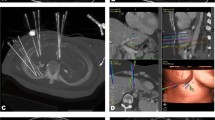Summary
The liver is one of the most involved organs in the case of hematogenous metastases of breast carcinoma. In strictly intrahepatic involvement of breast cancer local ablative methods like surgical resection and minimal-invasive treatment modalities are discussed when systemic chemo- or hormone therapies are ineffective. In the clinical programme 51 patients with secondary metastastic involvement of the liver due to breast carcinoma were prospectively treated via MR-guided laser-induced thermotherapy in an outpatient setting. Patients were included with a maximum of five lesions up to a maximum diameter of 5 cm. Patients with additional extrahepatic involvement are excluded. MR-guided LITT allowed local tumor control in the liver at three months of 89.2 % and at six months of 79.1 %. The cumulative median survival rate was 50,29 months (confidence interval 95 %, 41.99–42.22 months). MR-guided LITT allows high local tumor control. Possible indications for the treatment with LITT are patients with strictly intrahepatic metastases who are not demonstrating a complete response after chemo- or hormone therapy.
Zusammenfassung
Im Rahmen der hämatogenen Metastasierung des Mammakarzinoms stellt die Leber ein häufig betroffenes Organ dar. Im Falle eines isolierten Befalls der Leber werden bei fehlendem Ansprechen auf Chemo- und Hormontherapie im Einzelfall lokal sanierende Maßnahmen wie die chirurgische Resektion oder auch minimal-invasive Verfahren wie Tumorablationen diskutiert. Im Rahmen eines klinischen Programms wurden daher prospektiv 51 Patienten mit sekundär metastatischem Befall der Leber bei Mammakarzinom mittels MR-gesteuerter laserinduzierter Thermotherapie in Lokalanästhesie therapiert. Die mittels MR-gesteuerter LITT erzielte lokale Tumorkontrolle in der Leber lag in der 3-Monats-Kontrolle bei 98,2 %, in der 6-Monats-Kontrolle bei 97,1 %. Die mittlere Überlebensrate, berechnet ab Diagnosestellung der gelaserten Metastase betrug 50,29 (95-%-Konfidenzintervall (KI) 41,99–58,59) Monate. Berechnet ab dem Tag der Laserbehandlung betrug die mittlere Überlebensrate 36,31 (95-%-KI 30,40 – 42,22) Monate. Die LITT erlaubt heute eine hohe lokale Tumorkontrollrate; mögliche Indikationen liegen bei Patienten mit primär hepatischer Metastasierung, bei denen trotz Chemo- und Hormontherapie residuelle Lebermetastasen nachgewiesen werden oder diese progredient sind.
Similar content being viewed by others
Author information
Authors and Affiliations
Rights and permissions
About this article
Cite this article
Vogl, T., Mack, M., Straub, R. et al. Interventional laser-induced thermotherapy of hepatic metastases from breast cancer. Method and clinical outcome. Gynäkologe 32, 666–674 (1999). https://doi.org/10.1007/PL00003280
Published:
Issue Date:
DOI: https://doi.org/10.1007/PL00003280




